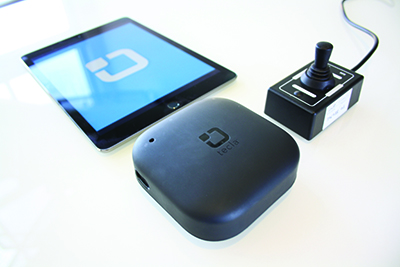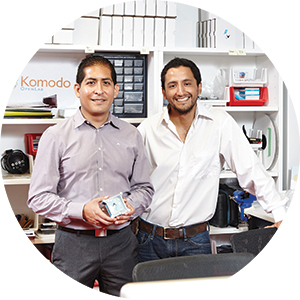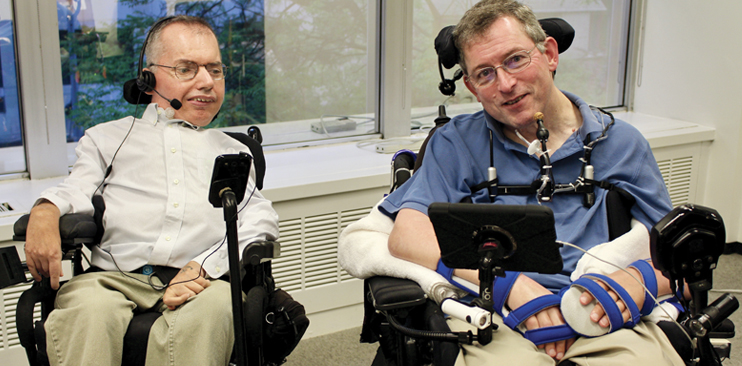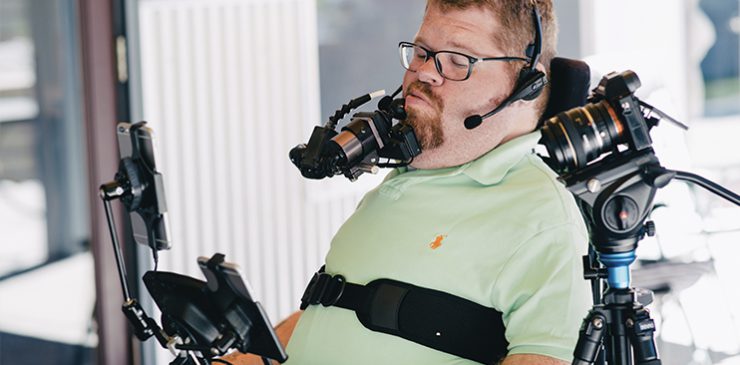Tecla allows an individual to interact with their iOS and Android devices, computers, and smart home systems, hands-free. This means you can use Tecla and your smart devices anywhere you are.

tecla-e is the newest version of Tecla. The cloud-connected assistive device provides users with control of their smart devices and environment. It can pair with up to eight (8) Bluetooth devices and the user can switch between them by pressing and holding one of their switches. tecla-e can control internet-enabled appliances via its WiFi connection, this is done through smart home platforms/services. tecla-e has location, temperature, motion, and ambient light sensors.
The information gathered by these sensors can be uploaded to the cloud and accessed through the Tecla apps for iOS and Android. The user can make this information available to family and caregiver who have also downloaded the app for extra peace of mind.

Tecla’s co-founders, Mauricio Meza and Jorge Silva, are both biomedical engineers who have years of experience in the assistive technology field. Mauricio, who some of our readers may remember, used to work at Lyndhurst Rehabilitation Centre in Assistive Technology Services. He said, “I left Lyndhurst to go back to school to study business. I saw a need among clients at Lyndhurst, and I started a business plan on an accessible iPhone. After finishing my degree, I met Jorge who was working on a prototype of an iPhone that would help people with disabilities. Our idea was to make it mainstream rather than building something from scratch. It needed to be inexpensive and give people with disabilities the access to technology that they were asking for.
“All Tecla users are unique. This is why we built a device that can be used in countless different ways to encourage people with disabilities to use technology to increase their independence at work or at play. tecla-e is a device that benefits young students as much as it benefits teens, adults and our aging population.”
Komodo Open Lab, is based out of the Biomedical Zone (BMZ) at St. Michael’s Hospital in the heart of downtown Toronto. The BMZ is a partnership with Ryerson University and St. Michael’s Hospital which is an incubator for companies focused on health care. Here, they are able to work with clinicians doing clinical trials, other health care professionals, and be connected with health care organizations. “As we’re expanding manufacturing and production, we will eventually need more space, and will find our own space out of the BMZ,” said Mauricio.
Basically, the Tecla box is a hub and you can connect to anything that is switch adapted. That includes your wheelchair, phone, TV, smart appliances, lights, etc. Certain things like opening doors is possible, but you would require additional/ different hardware. Other Tecla devices include mountings and switches that you can blow. It is portable during the day in your chair, or you can remove it and put it at your bedside and continue using your devices in bed.
Tecla currently has approximately 5,000 users, is reasonably priced at $660, and the company has a #1-888 support line. They also offer a ‘by appointment’ consultation service, which is primarily used by clinicians when they are with their client doing the set-up.
What differentiates Tecla from others is that it gives access to Apple, Google and Amazon Alexa, and Alexa can be accessed through the app whether the user has an Echo or not. Tecla also gives access to Alexa to people who aren’t vocal, e.g., use a ventilator or have a strong accent, by connecting to the Alexa account and creating commands for Alexa through switches. This also works for people who have memory issues and can’t remember commands. If they save the command, and press the button, Alexa will respond to that command.
Set-up is pretty simple. Usually, a clinician will help you set up Tecla. “We work with clinicians at Lyndhurst who are assisting patients looking for products that might help them in their daily life,” said Mauricio. “Everyone’s needs are different, and a clinician can help tailor our product to their patient’s needs.”
Tecla have a lot of people who buy their product online, and they will have a family member or caregiver help them with set-up. Their website also has videos and an online course that helps with set-up.
Tecla currently has approximately 5,000 users, is reasonably priced at $660, and the company has a # 1-888 support line. They also offer a ‘by appointment’ consultation service, which is primarily used by clinicians when they are with their client doing the set-up.
The future of Tecla looks bright. The bulk of their business is in Canada and the USA, but their digital marketing and blogs are attracting people from as far away as Australia and England.
They have a distributor in Germany and are looking for other partners to help expansion in Europe and Asia. And product innovations are in the works with the addition of temperature, motion, light and location sensors.
They will soon be releasing monitoring systems so people will be able to follow users and the environment around them. The biggest innovation to come will be when Tecla will be able to automatically trigger lights, communicate to other public terminals like Toronto’s public transit Presto system, talk to an elevator to tell it what floor you want to go to, etc.

The possibilities are endless. Komodo Open Lab has received development grants for its work, first from the Ontario Centres of Excellence and support from the Industrial Research Assistant Program. They are currently working on a pilot project with Holland Bloorview Kids Rehabilitation Hospital – made in Ontario Health Technologies for kids – to try Tecla, versus traditional assistive devices. They are testing Tecla’s affordability and if, when using the device, kids can complete tasks faster, etc.
The early version of Tecla was covered by the government’s Assistive Devices Program (ADP). The company is now working with clinicians to get their endorsement of the new tecla e, to have the clinicians recommend/apply to have it on the list of products that are funded by ADP.
For more information on Tecla, please visit www.gettecla.com.






